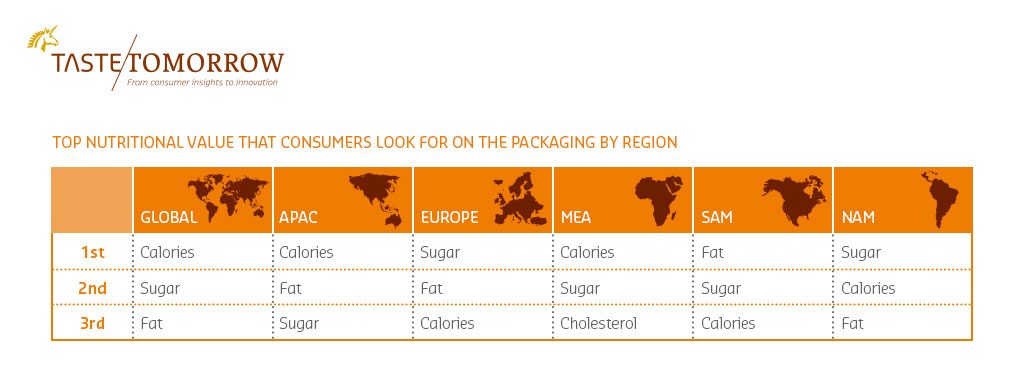Today, consumers want to live a healthy life more than ever before. Consumers’ expectations with regard to health continue to evolve, but food always plays an important role in a healthy lifestyle. In 2019 it’s no longer just about calorie intake and getting rid of ‘bad’ ingredients like fat, sugar or salt. Nutritional factors are becoming more important and most consumers want their food to be healthy for the planet as well.
‘Taste Tomorrow’: Nine Trends for Setting a ‘Foodstep’ into the Future
‘Taste Tomorrow’ is the world’s largest bakery, patisserie and chocolate consumer survey, conducted in 40 countries to gather data from over 17,000 consumers. The study was first conducted in 2011 and now, eight years later, the results of this third edition has identified nine key worldwide trends. One of these trends is ‘health’.
Consumers Believe that Food will Become Healthier
The survey shows that 34% of consumers worldwide believe that food will become healthier. It’s good to know that consumers were not always this positive about the development of healthy food. In 2015, the survey revealed the trend Food under pressure: a worldwide pessimism that food would become less healthy in the future. Today, we see consumers being more positive about future developments.
Healthiness is No Longer Just About Removing Ingredients
What is a healthy product, according to consumers? In the 2015 survey this was mainly about reducing our intake of certain ingredients: less sugar, less fat, less salt. Today, the concept of healthiness has undergone a tremendous evolution. It is now about simultaneously eradicating undesirable ingredients and making use of ingredients that contribute to better health, like fibres, proteins and whole grains.
Important Nutritional Information for Consumers
If we were to take a look at the nutritional information that consumers look for on packaging when buying bread, pastry, patisserie or chocolate products, we would see that the top three items are calories, fat and sugar. One in three consumers also frequently looks for information on carbohydrates. Consumer opinion of the most important nutritional information on the packaging varies from one region to another (see the visual for regional differences). Still, a concise, clean and clear label showing mainly natural ingredients and ingredient names consumers are familiar with or understand is becoming more and more important worldwide.
Good for the Planet and Me
The trend towards more healthy food is closely connected to the consumer demand for an Ethical Lifestyle: a lifestyle that is not only good for themselves, but also for the planet, the people and future generations. The ‘Taste Tomorrow’ survey revealed that 45% of consumers throughout the world believe that a vegan diet has a positive impact on the environment. But vegan is about more than just the environment: it’s also seen as good for me. Consumers think that plant-based products are not only less harmful for the resources of Mother Earth (environmental sustainability); they also have a positive impact on their health. More than one in eight consumers (15%) already buys vegan or vegetarian food on a weekly basis. At global level, consumers believe they will buy more such food in the future.
Health Should Never Compromise on Taste
While health is of growing importance for consumers worldwide, it should never compromise on taste. Consumers want products that are tasty as well as healthy. Bread products that are considered both tasty and healthy contain wholemeal flour, fibre, grains and seeds. These are recognised by consumers as power ingredients that make products healthier and tastier at the same time. Sourdough bread is also seen as tasty, healthy and natural.
With regard to patisserie, nuts, fibre, vegetables and fruit filling are considered to be power ingredients. Healthy and tasty ingredients in chocolate products are cocoa, followed by fibre, nuts, super fruits, floral extracts, fruit filling and seeds. These are all products that consumers recognise as being 100% natural and thereby full of goodness.
These Concepts Put Their Efforts in Healthy Food
A growing number of companies respond to the increasing demand for food that is healthy, and preferably also sustainable. Discover these inspiring examples:
- Habit is a personalised nutrition company that is making optimal nutrition possible. Unlike one-size-fits-all diets, Habit uses an at-home test to disclose details about genetics, lifestyle, metabolism and goals to design personalised dietary recommendations (https://habit.com/).
- Brightseed identifies plant-based nutritional bioactives from commodity crops and incorporates these highly beneficial ingredients into everyday food products. By restoring nutrients that have been lost in our modern diet, Brightseed strengthens the body’s inherent ability to restore itself and maintain good health (https://brightseedbio.com/).
- Beyond Meat offers mass-market solutions (hamburgers, sausages and crumbles) that substitute animal protein with plant protein. Beyond Meat is dedicated to improving human health, having a positive impact on climate change, conserving natural resources and respecting animal welfare (https://www.beyondmeat.com/).
To summarize the health trend, we can state that healthy food is about consumers expecting more of the good and less of the bad. They want fewer calories and less fat, sugar and salt, while opting for products with more fibre, whole grains and proteins. It’s important to highlight the ‘power ingredients’ that are considered to be both healthy and tasty.
Want to learn more about consumer expectations and solutions with regard to healthy food? Puratos will be present at the Global Summit, so feel free to visit us at our booth for more information or surf to www.tastetomorrow.com.
This post was written and contributed by:
Daniel Malcorps
Group CEO
Puratos


